|
Books Should Be Free Loyal Books Free Public Domain Audiobooks & eBook Downloads |
|
|
Books Should Be Free Loyal Books Free Public Domain Audiobooks & eBook Downloads |
|
Essay/Short Nonfiction |
|---|
|
Book type:
Sort by:
View by:
|
By: Anthony Pelcher (1897-1981) | |
|---|---|
 Astounding Stories 04, April 1930
Astounding Stories 04, April 1930
The fourth issue of Astounding Stories continues Ray Cummings serial "Brigands of the Moon", along with pulp sci-fi stories by Capt. S. P. Meek, Anthony Pelcher and other authors. | |
By: Harl Vincent (1893-1968) | |
|---|---|
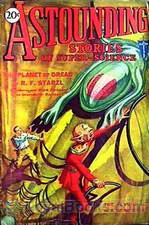 Astounding Stories 08, August 1930
Astounding Stories 08, August 1930
Issue eight of this seminal science-fiction magazine CONTENTS Murder Madness by Murray Leinster - the conclusion of this novel Earth the Maurader by Arthur J. Burks - Part 2 of a 3 Part novel as well as short Stories The Planet of Dread by R.F. Starxl, The Lord of Space by Victor Rousseau, The Second Satellite by Edmund Hamilton, Silver Dome by Harl Vincent and The Flying City by H. Thompson Rich | |
By: Thomas Newbigging (1833-1914) | |
|---|---|
 Lancashire Characters and Places
Lancashire Characters and Places
An eclectic collection of essays on late 19th-century Lancashire culture and life, including essays on the poets John Critchley Prince and Edwin Waugh. Thomas Newbigging was born in Glasgow and died in Knutsford, Chesshire, living in between in Rossendale, Pernambuco, and Manchester. A gas manager by profession and writer-historian by inclination, his two major works were the Handbook for Gas Engineers and Managers (1889) and the History of the Forest of Rossendale (1893). | |
By: Murray Leinster (1896-1975) | |
|---|---|
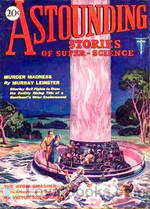 Murder Madness
Murder Madness
Murder Madness! Seven Secret Service men had completely disappeared. Another had been found a screaming, homicidal maniac, whose fingers writhed like snakes. So Bell, of the secret "Trade," plunges into South America after The Master--the mighty, unknown octopus of power whose diabolical poison threatens a continent! | |
By: Captain S. P. Meek (1894-1972) | |
|---|---|
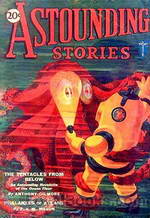 Astounding Stories 14, February 1931
Astounding Stories 14, February 1931
This issue includes "Werewolves of War" by D. W. Hall, "The Tentacles from Below" by Anthony Gilmore, "The Black Lamp" by Captain S. P. Meek, "Phalanxes of Atlans" by F. V. W. Mason, and contues with "The Pirate Planet" by Charles W. Diffin, | |
By: Sewell Peaslee Wright (1897-1970) | |
|---|---|
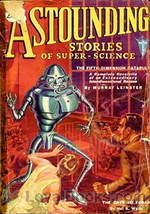 Astounding Stories 13, January 1931
Astounding Stories 13, January 1931
This issue contains "The Dark Side of Antri" by Sewell Peaslea Wright, "The Sunken Empire" by H. Thompson Rich, "The Gate to Xoran" by Hal K. Wells, "The Eye of Allah" by C. D. Willard, "The Fifth-Dimension Catapult" by Murray Leinster, and "The Pirate Planet[' by Charles W. Diffin. | |
 Astounding Stories 07, July 1930
Astounding Stories 07, July 1930
Issue seven of this seminal science-fiction magazine | |
By: Jack Williamson (1908-2006) | |
|---|---|
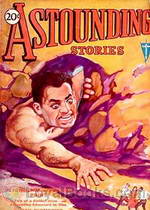 Astounding Stories 15, March 1931
Astounding Stories 15, March 1931
This issue includes "When the Mountain Came to Miramar" by Charles W. Diffin, "Beyond the Vanishing Point" by Ray Cummings, "Terrors Unseen" by Harl Vincent, the conclusion of "Phalanxes of Atlans" by F. V. W. Mason, and "The Meteor Girl" by Jack Williamson. | |
By: Charles Willard Diffin (1884-1966) | |
|---|---|
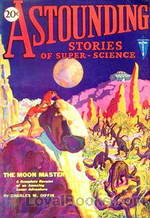 Moon Master
Moon Master
Through Infinite Deeps of Space Jerry Foster Hurtles to the Moon—Only to be Trapped by a Barbaric Race and Offered as a Living Sacrifice to Oong, their Loathsome, Hypnotic God. | |
By: Lydia Maria Child (1802-1880) | |
|---|---|
 The Freedmen's Book
The Freedmen's Book
Lydia Maria Child, an American abolitionist, compiled this collection of short stories and poems by former slaves and noted activists as an inspiration to freed slaves. In her dedication to the freedmen, she urges those who can read to read these stories aloud to others to share the strength, courage and accomplishments of colored men and women. In that spirit, this recording aims to gives that voice a permanent record. As in the original text, the names of the colored authors are marked with an "x". | |
By: Harl Vincent (1893-1968) | |
|---|---|
 Astounding Stories 10, October 1930
Astounding Stories 10, October 1930
Issue no. 10 of the magazine brings you:- Stolen Brains by Captain S.P. MeekThe Invisible Death by Victor Rousseau Prisoners on the Electron by Robert H. Leitfred Part 2 of Jetta of the Lowlands by Ray Cummings An Extra Man by Jackson Gee along with the Readers' Corner and interesting scientific facts | |
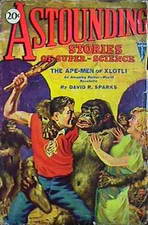 Astounding Stories 12, December 1930
Astounding Stories 12, December 1930
This issue includes "Slaves of the Dust" by Sophie Wenzel Ellis, Part B of "The Pirate Planet" by Charles W. Diffin, "The Sea Terror" by Captain S. P. Meek, "Gray Denim" by Harl Vincent, and "The Ape-Men of Xlotli" by David R. Sparks. | |
By: Various | |
|---|---|
 Punch, or the London Charivari
Punch, or the London Charivari
MANUAL OF SURGERY, OXFORD MEDICAL PUBLICATIONSBY ALEXIS THOMSON, F.R.C.S.Ed.PREFACE TO SIXTH EDITION Much has happened since this Manual was last revised, and many surgical lessons have been learned in the hard school of war. Some may yet have to be unlearned, and others have but little bearing on the problems presented to the civilian surgeon. Save in its broadest principles, the surgery of warfare is a thing apart from the general surgery of civil life, and the exhaustive literature now available on every aspect of it makes it unnecessary that it should receive detailed consideration in a manual for students... | |
 The Illustrated War News
The Illustrated War News
THE ILLUSTRATED WAR NEWS, N.B.--REMOVE INSETTED LEAFLET, DEC. 30 1914.THE GREAT WAR. In reviewing the events of the last week throughout the world-wide area of war, let us begin with the Dark Continent, where everything went in our favour--very brilliantly so. First of all, then, we may now be said to have completed our conquest of the German Cameroon country by taking possession of the whole of the railway which runs northward from Bonabari, and is now in the hands of our troops. A... | |
By: George Bernard Shaw (1856-1950) | |
|---|---|
 Quintessence of Ibsenism (Version 2)
Quintessence of Ibsenism (Version 2)
InThis is an essay providing an extended analysis of the works of Norwegian playwright Henrik Ibsen and of Ibsen's critical reception in England. Shaw uses this "exposition of Ibsenism" to illustrate the imperfections of British society, using the idea of an imaginary "community of a thousand persons," divided into three categories: Philistines, Idealists, and the lone Realist. The main discussion revolves around Ibsen's recurring topic of the strong character holding out against social hypocrisy, while stating in his essay's final sentence that the quintessence of Ibsenism is that "there is no formula." ( Michele Eaton) | |
By: S. Baring-Gould (1834-1924) | |
|---|---|
 Curiosities of Olden Times
Curiosities of Olden Times
This book is a collection of 17 gems of random knowledge, such as what women are made of and the philosopher's stone, written in Baring-Gould's own style. | |
By: An Anti-Slavery Convention of American Women (1837-1837) | |
|---|---|
 Address to Free Colored Americans
Address to Free Colored Americans
The first Anti-Slavery Convention of American Women met in New York City in May, 1837. Members at the Convention came from all walks of life and included such prominent women as Mary Parker, Lucretia Mott, the Grimke sisters, and Lydia Maria Child. One outcome of this important event was a statement of the organization’s role in the abolitionist movement as expressed in AN ADDRESS TO FREE COLORED AMERICANS, which begins: “The sympathy we feel for our oppressed fellow-citizens who are enslaved... | |
By: Various | |
|---|---|
 Short Nonfiction Collection Vol. 028
Short Nonfiction Collection Vol. 028
A collection of short nonfiction works in the public domain. The selections included in this collection were independently chosen by the readers, and the topics encompass history, slavery, science, education, humor, philosophy, nature and baseball. | |
By: Lafcadio Hearn (1850-1904) | |
|---|---|
 Exotics and Retrospectives
Exotics and Retrospectives
Lafcadio Hearn, born 1850 in Greece, went to Japan when he was 40 years old and became a Japanese citizen only 6 years later. His writings about Japan from the beginning of the Meiji era, when the country was just opening to the West, remain among the most important explanations of Japanese culture. This book contains in the first part, "Exotics", his observations of and personal insights into Japan. For example, Fuji no Yama tells about him climbing the highest mountain in Japan; and A Question in the Zen Texts, Literature of the Dead, and Of Moon Desire try to explain Buddhist teachings... | |
By: Various | |
|---|---|
 Short Nonfiction Collection Vol. 031
Short Nonfiction Collection Vol. 031
Fifteen short nonfiction works in the public domain, independently chosen by the readers. Topics include the Faust Legend, Stephen Crane, Sundials and the Statue of Liberty. | |
By: James Elroy Flecker (1884-1915) | |
|---|---|
 Collected Prose
Collected Prose
Best remembered for his poetry, James Elroy Flecker was also a playwright, novelist and prose writer. This collection of his idiosyncratic prose writings includes The Last Generation (a short science fiction story), short sketches, a dialogue, and several critical studies. | |
By: Giacomo Leopardi (1798-1837) | |
|---|---|
 Essays and Dialogues
Essays and Dialogues
"We would no more choose to feed the minds of our countrymen and women with the despairing utterances of the pessimist poet, than we would their bodies with hasheesh. Such melancholy as his clothed in such eloquent words may be the luxury of the idle; it is poison to those who have work to do in the world. It shuts out hope, the very spring of energy; it makes the cheerful steady pursuit of duty a thing utterly beyond human powers. For we can none of us stand alone. Either in human or divine love we must find the mainspring of all life worth living... | |
By: Henry Cabot Lodge (1850-1924) | |
|---|---|
 Theodore Roosevelt; An Address Delivered Before The Congress Of The United States
Theodore Roosevelt; An Address Delivered Before The Congress Of The United States
A biographical encomium delivered on the occasion of Roosevelt's death. Theodore "T.R." Roosevelt, Jr. (1858 – 1919) was an American author, naturalist, explorer, historian, and politician who served as the 26th President of the United States. He was a leader of the Republican Party (the "GOP") and founder of the Progressive Party. He is noted for his exuberant personality, range of interests and achievements, and his leadership of the Progressive Movement, as well as his "cowboy" persona and robust masculinity... | |
By: Various | |
|---|---|
 Short Nonfiction Collection, Vol. 035
Short Nonfiction Collection, Vol. 035
Eighteen short nonfiction works in the public domain, independently chosen by the readers. Topics include how to swim, Navajo silversmithing, the sun, begonias and ferns, Martin Luther, U.S. Presidents Eisenhower and Nixon, Captain Cook's exploration of Botany Bay, General James Wolfe, and Moravian missionaries in Labrador. | |
By: Lucius Annaeus Seneca (4-65) | |
|---|---|
 Moral Letters, Vol. I
Moral Letters, Vol. I
"Among the personalities of the early Roman Empire there are few who offer to the readers of to-day such dramatic interest as does Lucius Annaeus Seneca, the author of the Epistles which are translated in this volume. ... In these letters, it is impossible to ignore the advance from a somewhat stiff and Ciceronian point of view into the attractive and debatable land of what one may fairly call modern ideas. The style of the Epistles is bold, and so is the thought." (from the Introduction) | |
By: Robert G. Ingersoll (1833-1899) | |
|---|---|
 Selected Interviews with Robert G. Ingersoll, Volume 2
Selected Interviews with Robert G. Ingersoll, Volume 2
A controversial lecturer and famous orator of the mid 1800's, Ingersoll railed against the absurdities of the Bible and cruelties of orthodox Christianity, tirelessly supported the arts, education, science, women’s rights, abolition, home, family, children, and human liberty, whose creed was: “Happiness is the only good, Reason the only torch, Justice the only worship, Humanity the only religion, and Love the only priest.” He was often attacked from the pulpit and in the press. Here are 30 more published interviews (from among hundreds), in which Ingersoll spoke extemporaneously, bitingly, sometimes hilariously, on a wide range of topics, with newspaper reporters of the day... | |
By: Stuart Johnson Reid (1848-1927) | |
|---|---|
 Selected Essays of Samuel Johnson
Selected Essays of Samuel Johnson
This is a volume of selected essays by "the great master of reason" Samuel Johnson. The most famous exerpts from The Rambler, The Adventurer and The Idler are included, covering a vast range of topics. | |
By: Various | |
|---|---|
 Negro Problem
Negro Problem
This is a collection of essays, edited by Booker T. Washington, representative of what historians have characterized as "racial uplift ideology." These and other similar narratives of the time were a reaction to the gradual erosion of the African-American's civil rights across the United States that began during Reconstruction. | |
By: Herbert Allen Giles (1845-1935) | |
|---|---|
 Chinese Sketches
Chinese Sketches
Herbert Giles was in the diplomatic service in China from 1867 to 1893. His frank observations on Chinese culture and people form the basis of these short essays, published in 1876. On his retirement, he returned to England and served as the Chair of Chinese at Cambridge for 35 years. | |
By: Various | |
|---|---|
 Short Nonfiction Collection, Vol. 039
Short Nonfiction Collection, Vol. 039
Eighteen short nonfiction works in the public domain, independently chosen by the readers. Topics include literary figures--Alice Mangold Diehl, Harriet Beecher Stowe, and Arthur Hugh Clough; philosophers--Hegel, Kierkegaard; religious thinkers--Martin Luther, Cotton Mather; political leaders--Thomas Jefferson, John F. Kennedy; important documents--the Constitution of Japan (1946), the Virginia Statute for Religious Freedom; moments in history--the Battle of the Crater, the Dred Scott Decision; historical figures--the Pseudo Dionysius and Xenophon; and, lastly, shopper's tips for watermelons and cantaloupes. | |
By: Thomas Browne (1605-1682) | |
|---|---|
 Religio Medici, Hydriotaphia and Letter to a Friend
Religio Medici, Hydriotaphia and Letter to a Friend
Selections from the varied writings of a 17th century English doctor with a well-stocked mind, an interest in the new science of his age and a deep religious faith. His prose is famous for its Baroque complexity and its frequent eloquence. Sir Thomas endowed English with numerous quotations and was a notable coiner of words, many of which are still in common use. | |
By: Benjamin Franklin (1706-1790) | |
|---|---|
 Silence Dogood Letters
Silence Dogood Letters
As a teenager, Benjamin Franklin apprenticed with his brother James at the shop where The New-England Courant was printed. Since James would not publish any of Benjamin's works, fifteen-year-old Benjamin sent letters to The New England Courant under the pseudonym Silence Dogood. A total of fourteen letters were sent, one each fortnight, between April and December of 1722. (Introduction by Darcy Smittenaar) | |